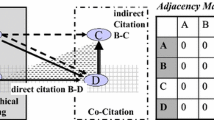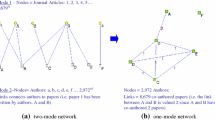Abstract
Network analysis allows us to introduce different metrics that complement the traditional indicators to measure academic performance, generally based on individual production. In this paper, we show how the use of these techniques provides a more global point of view, introducing indicators that, beyond individual merits, measure the capacity of researchers to generate more intangible assets. We focus on collaboration among groups that can enrich the potential of the research ecosystem as a whole. We present not only numerical indicators, but also several visualisation schemes to see how this approach can help in the academic evaluation and decision-making process of research managers. We have used, as a case study, the research ecosystem formed by more than five thousand economists from Spanish institutions.










Similar content being viewed by others
References
Alvarez R, Cahué E, Clemente-gallardo J, Ferrer A, Iñíguez D, Mellado X, Rivero A, Ruiz G, Sanz F, Serrano E, Tarancón A, Vergara Y (2015) Analysis of academic productivity based on complex networks. Scientometrics 104:651–672
Andrikopoulos A, Economou L (2016) Coauthorship and subauthorship patters in financial economics. Int Rev Financ Anal 46:12–19
Araujo T, Fontainha E (2017) The specific shapes of gender imbalance in specific authorships: a network approach. J Informetr 11:88–102
Arroyo L, Gallardo-Gallardo E, Gallo P (2017) Understanding scientific communities: a social network approach to collaborations in talent management research. Scientometrics 113:1439–1462
Bergantiños G, Da Rocha JM, Polomé P (2002) La investigación española en Economía, 1995–1999. Investig Econ 26:373–392
Bergé L, Scherngell T, Wanzenböck I (2017) Brinding centrality as an indicator to measure the “brinding role” of actors in networks: an application to the European Nanotechnology co-publication network. J Informetr 11:1031–1042
Boccaletti S, Latora V, Moreno Y, Chavez M, Hwang DU (2006) Complex networks: structure and dynamics. Phys Rep 424:175–308
Bordons M, Aparicio J, González-Albo B, Díaz-Faes A (2015) The relationship between the research performance of scientists and their position in co-authorship networks in three fields. J Informetr 9:135–144
Bornmann L, Stefaner M, de Moya F, Mutz R (2016) Excellence networks in science: a Web-based application based on Bayesian multilevel logistic regression (BMLR) for the identification of institutions collaborating successfully. J Informetr 10:312–327
Card D, DellaVigna S (2013) Nine facts about top journals in economics. J Econ Lit 51(19):144–161
Carrasco R, Ruiz-Castillo J (2014) The evolution of the scientific productivity of highly productive economists. Econ Inq 52:1–16
Clauset A, Shalizi CR, Newman MEJ (2009) Power law distributions in empirical data. SIAM Rev 51:661–703
Clerides S, Pashardes P, Polycarpou A (2011) Peer review vs metric-based assessment: testing for bias in the RAE ratings of UK economics departments. Economica 78(311):565–583
Cobo MJ, López-Herrera AG, Herrera-Viedma E, Herrera F (2011) Science mapping software tools: review, analysis, and cooperative study among tools. J Am Soc Inf Sci Technol 62(7):1382–1402
Colavizza G (2017) The structural role of the core literature in history. Scientometrics 113:1787–1809
Costa L, Siqueira M, Alves L, Motta E (2017) Growth patterns of the network of international collaboration in science. Scientometrics. https://doi.org/10.10007/s11192-017-2573x
de Price DJS (1965) Networks of scientific papers. Science 149(3683):510–515
Ding Y, Yan E, Frazho A, Caverlee J (2009) PageRank for ranking authors in co-citation networks. J Am Soc Inf Sci Technol 60(11):2229–2243
Ductor L (2016) Does co-authorship lead to higher academic productivity? Oxf Bull Econ Stat 77(3):385–407
Dusansky R, Vernon CJ (1998) Rankings of U.S. economics departments. J Econ Perspect 12:157–170
Fruchterman TMJ, Reingold EM (1991) Graph drawing by force-directed. Softw Pract Exp 21(11):1129
Goyal S, Van Der Leij MJ, Moraga-González JL (2006) Economics: an emerging small world. J Polit Econ 114(2):403–412
Hamermesh DS (2015) Citations in economics: measurement, uses and impacts. IZA DP no. 9593
Inzelt A, Schubert A, Schubert M (2009) Incremental citation impact due to international co-authorship in Hugarian higher education institutions. Scientometrics 78:37–43
Kalaitzideakis P, Mamuneas TP, Stengos T (1999) European economics: an analysis based in publications in the core journals. Eur Econ Rev 43:1150–1168
Kalaitzideakis P, Mamuneas TP, Stengos T (2003) Rankings of academic journals and institutions in economics. J Eur Econ Assoc 1(6):1343–1366
Kalaitzideakis P, Mamuneas TP, Stengos T (2011) An updated ranking of academic journals in economics. Can J Econ 44(4):1525–1538
Katranidis S, Panagiotidis T, Zontanos C (2014) An evaluation of the Greek universities’ economics departments. Bull Econ Res 66(2):173–182
Katranidis S, Panagiotidis T, Zontanos C (2017) Economists, research performance and national inbreeding: north versus south. Econ Notes 46(1):145–163
Kumar S (2015) Co-authorship networks: a review of the literature. Aslib J Inf Manag 67(1):55–73
Kyvik S, Reymert I (2017) Research collaboration in groups and networks: differences across academic fields. Scientometrics 113:951–967
Letina S (2016) Network and actor attribute effects on the performance of researchers in two fields of social science in a small peripheral community. J Informetr 10:571–595
Levenshtein I (1996) Binary codes capable of correcting deletions, insertions and reversals. Cybern Control Theory 10:7076710
Liebowitz SJ, Palmer JP (1984) Assessing the relative impacts of economic journals. J Econ Lit 22:77–88
Macri M, Sinha D (2006) Rankings methodology for international comparisons of institutions and individuals: an application to economics in Australia and New Zealand. J Econ Surv 20:111–156
Moosa IA (2016) Citations, journal ranking and multiple authorships: evidence based on the top 300 papers in economics. Appl Econ Lett. https://doi.org/10.1080/13504851.2016.1176104
Newman MEJ (2006) Finding community structure in networks using the eigenvectors of matrices. Phys Rev E 74(3):036104
Newman MEJ (2010) Networks: an introduction. Oxford University Press, Oxford
Nowell C, Grijalva T (2011) Trends in co-authorship in economics since 1985. Appl Econ 43:4359–4375
Oswald AJ (2007) An examination of the reliability of prestigious scholarly journals: evidence and implications for decision-makers. Economica 74:21–31
Padial AA, Nabout JC, Wiqueira T, Bini LM, Diniz-Filho JAF (2010) Weak evidence for determinants of citation frequency in ecological articles. Scientometrics 85:1–12
Parreira M, Machado K, Logares R, Diniz-Filho J, Nabout JC (2017) The roles of geographic distance and socioeconomic factors on international collaboration among ecologists. Scientometrics 113:1539–1550
Perc M (2010) Growth and structure of Slovenia’s scientific collaboration network. J Informetr 4:475–482
Perianes-Rodriguez A, Ludo Waltman L, van Eck NJ (2016) Constructing bibliometric networks: a comparison between full and fractional counting. J Informetr 10:1178–1195
Polyakov M, Polyakov S, Iftekhar S (2017) Does academic collaboration equally benefit impact of research across topics? The case of agricultural, resource, environmental and ecological economics. Scientometrics 113:1385–1405
Pons P, Latapy M (2006) Computing communities in large networks using random walks. J Graph Algorithms Appl 10(2):191–218
Rainho O, Cointet J, Cambrosio A (2017) Oncology research in late twentieth century and turn of the century Portugal: a scientometric approach to its institutional and semantic dimensions. Scientometrics 113(2):867–888
Rath K, Wohlrabe K (2015) Recent trends in co-authorship in economics: evidence from RePEc. Appl Econ Lett. https://doi.org/10.1080/13504851.2015.1119783
Robert C, Arreto C, Azerad J, Gaudy J (2004) Bibliometric overview of the utilization of artificial neural networks in medicine and biology. Scientometrics 59:117–130
Ruiz-Castillo J, Carrasco R, Albarrán P (2014) The elite in economics. UC3M Working papers. Economics we1414, Universidad Carlos III de Madrid. Departamento de Economía.
Schubert A (2014) Sentences to remember from the first 100 volumes of the journal scientometrics. Scientometrics 100:1–13
Sutter M, Kocher M (2004) Patterns of co-authorship among economics departments in the USA. Appl Econ 36(4):327–333
Tang M, Cheng Y, Chen K (2017) A longitudinal study of intellectual cohesion in digital humanities using bibliometric analysis. Scientometrics 113:985–1008
Waltman L, van Eck NJ, Wouters P (2009) Counting publications and citations: is more always better? J Informetr 7:635–641
Acknowledgements
This paper was partially written while Jose Alberto Molina was Visiting Fellow at the Department of Economics of Boston College (US), to which he would like to express his thanks for the hospitality and facilities provided. Kampal Data Solutions S.L. thanks Web of Science for permission to publish the analysis of these data on its web page (research.kampal.com). This paper has benefited from funding from the Spanish Ministry of Economics (Projects ECO2012-34828 and FIS2015-65078-C2-2-P), and it has been dedicated to A. Calvo-Armengol, an expert in social networks, who died prematurely in 2007.
Author information
Authors and Affiliations
Corresponding author
Ethics declarations
Conflict of interest
The authors declare that they have no conflict of interest.
Ethical approval
This article does not contain any studies with human participants performed by any of the authors.
Rights and permissions
About this article
Cite this article
Molina, J.A., Ferrer, A., Iñiguez, D. et al. Network analysis to measure academic performance in economics. Empir Econ 58, 995–1018 (2020). https://doi.org/10.1007/s00181-018-1546-0
Received:
Accepted:
Published:
Issue Date:
DOI: https://doi.org/10.1007/s00181-018-1546-0




